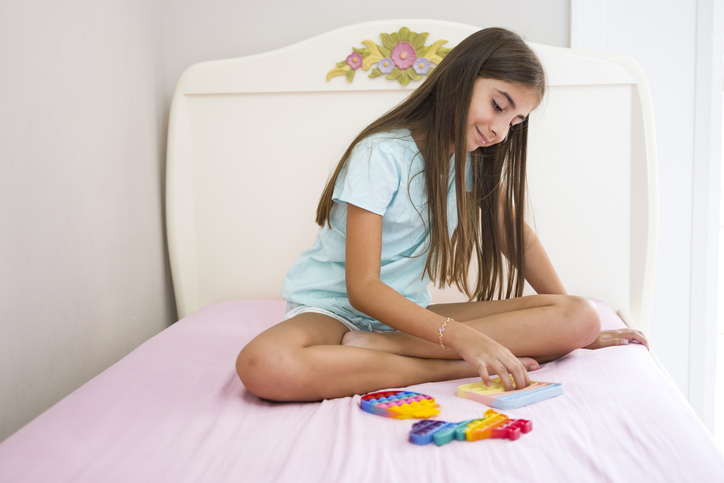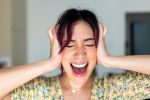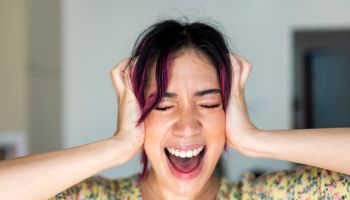
Source: Mehmet Hilmi Barcin / Getty
Anxiety disorders are the most common mental health concern in the United States. Over 40 million adults in the U.S. have an anxiety disorder. Meanwhile, approximately 7% of children aged 3-17 experience issues with anxiety each year. Most people develop symptoms before age 21. The numbers during the past 22 months have not been assessed yet, but they are climbing due to quarantining and masks, especially for school age kids who already had anxiety prior to the pandemic.
Anxiety disorders come in many forms, from general, to phobias and also full blown panic attacks. Genetics CAN play a role, but environment and diet play even bigger roles. Many cases of anxiety can be traced back to a traumatic event in one’s childhood. In addition, if a parent is overly anxious, for whatever reason, the child learns to react to situations as such. Kids are very impressionable. They learn how to handle life situations from those around them.
Holly Haze shares her story.
“Let me tell you about my kids before I dive into the topic of anxiety. I have three kids, now ages 24, 22 and 20. My oldest is low on the spectrum. He actually was not diagnosed until college believe it or not.
My middle child has ADD and has some sensory issues. Nothing off the charts or anything, but things that bothered him as a kid were certain materials of clothing, tags on clothing, textures. Still do bother him!
My youngest was a big surprise as she was an IUD baby. I did not even know I was pregnant until I was almost done with my first trimester. With that being said, she obviously was meant to be here because she defied many many odds that I won’t even get into! They told me I was going to miscarry when they removed the IUD but I did not, obviously. My daughter has anxiety and I truly think she got it in utero. It is very hard for me to be around someone who is anxious, especially when it’s your own daughter, because I want to tell her to snap out of it. I know it is not that easy. As you can imagine, being a health coach, none of my kids have been medicated for any of these disorders. I don’t take them lightly, I don’t dismiss their struggles, but I do approach them differently than most. Is it easy? No. Giving them a pill would be much easier, but I have a great distain for neurotoxic psychiatric drugs. It’s a slippery slope.”
These type of neurotoxins used to be prescribed by psychiatrists and psychiatrists only. Now you can walk in to your family doctor, internist, gynecologist even and take these drugs for a variety of reasons. Holly chimes in “Just a little reminder, there is not one prescription drug in the world that comes without side effects.”
Drug companies have a significant influence over the practice of medicine. Most doctors in our current medical system think that the westernized medicine has the best answers for most conditions including mental health issues. We forget that long before this type of treatment, there were other approaches.
It is important to get to a professional opinion and formulate a plan that works for you and your family.
Holly adds, “While my approach might not be the same for many others, I think we have created a very fragile generation. The trials and tribulations that our ancestors endured were very difficult compared to the challenges that we have today. I feel the need for effort is replaced with medicine these days. This frailty is making people avoid discomfort and instead settle for safety in a form of numbness that feels, at least temporarily, better than the discomfort but it also can truly hinder a spectacular life. Don’t get me wrong, for many people they need medication TO have that spectacular life.”
There are so many things that can improve mental health that are not drug related at all. Diet plays such an important role in physical health, but people don’t realize how much it affects your MENTAL health. There are so many neurotransmitters that influence our psychological state not to mention physiological and cognitive.
Serotonin for one. 95% of our serotonin is produced in our gastrointestinal tract. Numerous studies have shown that eating more fruit vegetables and even whole grains results in a lower risk of depression and anxiety.
Plants are better for the gut microbiome. Holly explains, “We have things called enterochromaffin (EC) cells.
These cells actually help food move through the G.I. tract. EC cells help serotonin production in the gut. This makes our gut microbes respond like an all natural Xanax factory. They produce GABA (gamma-aminobutyric acid) which supports our emotional well-being. Probiotics also improve mental health and reduce depression and anxiety. So much of how our bodies respond is affected by how productive and healthy our gut health is. I will KEEP saying it…our bodies are brilliant machines…IF we fuel the engine properly. Glitches happen as with any computer. Where the body is concerned, nearly 80% of those glitches are due to nutrition.”
As with anything, talk to your doctor or health care professional. Holly says “I did what worked for my family. Be your own advocate, for you and your kid(s). Was it easy? No. I made homemade baby food, I milled my own grains (true story), I make my own deodorant…I am diligent and I research to a fault. My kids think I am crazy, but I can tell you this…my oldest is studying anatomy and medicine and thanks me every day. It makes me teary, truly, because at the end of the day, my greatest accomplishment is my children.”


















